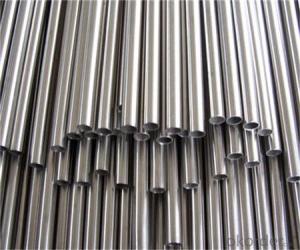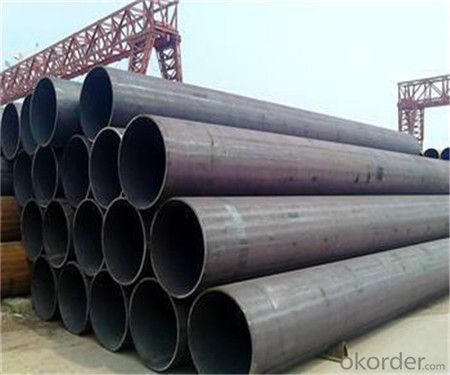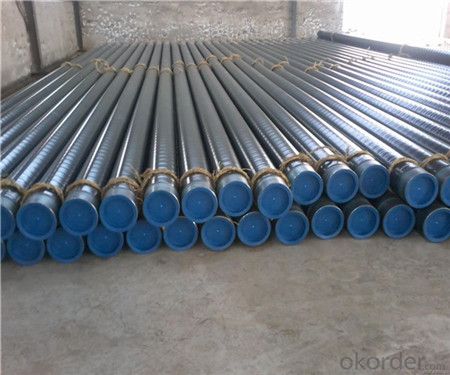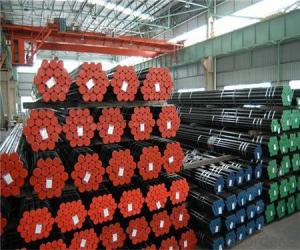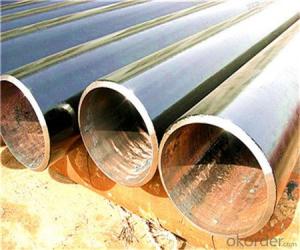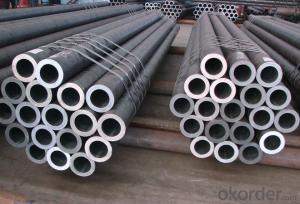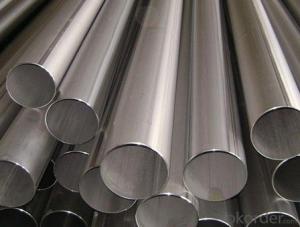Steel Pipe with API 5L-0733 / A53 /A106 from CNBM
- Loading Port:
- Tianjin
- Payment Terms:
- TT OR LC
- Min Order Qty:
- 25 m.t.
- Supply Capability:
- 20000 m.t./month
OKorder Service Pledge
OKorder Financial Service
You Might Also Like
1、Structure of API 5L-0733 Steel Pipe:
Seamless pipe is formed by drawing a solid billet over a piercing rod to create the hollow shell. As the manufacturing process does not include any welding, seamless pipes are perceived to be stronger and more reliable. Historically seamless pipe was regarded as withstanding pressure better than other types, and was often more easily available than welded pipe.
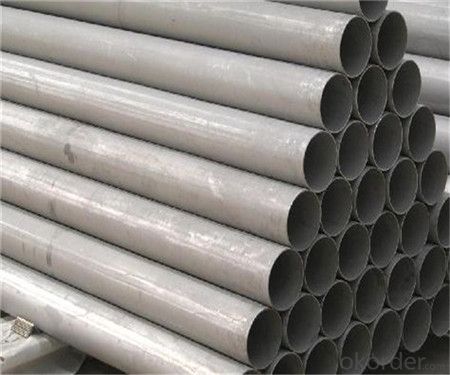
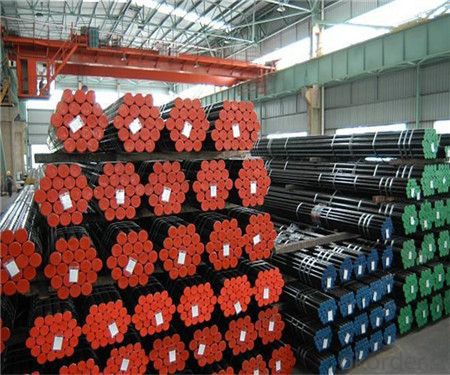
2、Main Features of API 5L-0733 Steel Pipe:
• High manufacturing accuracy
• High strength
• Small inertia resistance
• Strong heat dissipation ability
• Good visual effect
• Reasonable price
3、Packaging & Delivery
Packaging Details: | seaworthy package,bundles wrapped with strong steel strip |
Delivery Detail: | 15-30days after received 30%TT |
4、 API 5L-0733 Steel Pipe Specification:
Standard | GB, DIN, ASTM ASTM A106-2006, ASTM A53-2007 |
Grade | 10#-45#, 16Mn 10#, 20#, 45#, 16Mn |
Thickness | 8 - 33 mm |
Section Shape | Round |
Outer Diameter | 133 - 219 mm |
Place of Origin | Shandong, China (Mainland) |
Secondary Or Not | Non-secondary |
Application | Hydraulic Pipe |
Technique | Cold Drawn |
Certification | API |
Surface Treatment | factory state or painted black |
Special Pipe | API Pipe |
Alloy Or Not | Non-alloy |
Length | 5-12M |
Outer Diameter | 21.3-610mm |
Grade | 20#, 45#, Q345, API J55, API K55, API L80, API N80, API P110, A53B |
Standard | ASME, ASTM |
1) Material:20#(ASTM A 106/A53 GRB.API5LGRB,GB),45#,16Mn,10#.
2) Specification range:OD:21.3-610mm,WT:6-70mm,length:6-12m or according to the requirement of clients.
3) Excutive standards:GB,ASME API5L.ASTM A 106/A53,Despite of the above standards,we can also supply seamless steel pipe with standard of DIN,JIS,and so on,and also develop new products according to the requirements of our clients!
4) Surface:black lacquered,varnish coating or galvanized.
5) Ends:Beveled or square cut,plastic capped,painted.
6) Packing:bundle wrapped with strong steel strip,seaworthy packing.
5、FAQ of API 5L-0733 Steel Pipe:
①How is the quality of your products?
Our products are manufactured strictly according to national and internaional standard, and we take a test
on every pipe before delivered out. If you want see our quality certifications and all kinds of testing report, please just ask us for it.
Guaranteed: If products’ quality don’t accord to discription as we give or the promise before you place order, we promise 100% refund.
②How about price?
Yes, we are factory and be able to give you lowest price below market one, and we have a policy that “ for saving time and absolutely honest business attitude, we quote as lowest as possible for any customer, and discount can be given according to quantity”,if you like bargain and factory price is not low enough as you think, just don’t waste your time.Please trust the quotation we would give you, it is professional one.
③Why should you chose us?
Chose happens because of quality, then price, We can give you both.Additionally, we can also offer professional products inquiry, products knowledge train(for agents), smooth goods delivery, exellent customer solution proposals.Our service formula: good quality+good price+good service=customer’s trust
SGS test is available, customer inspection before shipping is welcome, third party inspection is no problem.
- Q: What are the different types of supports used for aboveground steel pipes?
- There are several types of supports commonly used for aboveground steel pipes, including pipe hangers, pipe clamps, pipe saddles, and pipe shoes. These supports are designed to provide stability and prevent excessive movement or vibration of the pipes, ensuring their proper alignment and preventing damage.
- Q: What are the different testing methods for steel pipes?
- Some of the different testing methods for steel pipes include non-destructive testing methods such as ultrasonic testing, magnetic particle testing, and radiographic testing. These methods are used to detect any defects or inconsistencies in the pipe's structure or material without causing any damage. Other testing methods include hydrostatic testing, which involves pressurizing the pipe with water to check for leaks or weaknesses, and mechanical testing, which measures the pipe's strength and durability through tensile, hardness, and impact tests.
- Q: How do steel pipes handle chemical exposure?
- Steel pipes are generally known for their excellent resistance to chemical exposure. The high strength and durability of steel make it a reliable material for handling various chemicals. Steel pipes can withstand exposure to a wide range of corrosive substances such as acids, alkalis, solvents, and gases without experiencing significant degradation or damage. One of the main reasons steel pipes handle chemical exposure well is due to their inherent corrosion resistance. Steel is naturally resistant to corrosion and can form a protective oxide layer on its surface, which acts as a barrier against chemical attack. Additionally, steel pipes can be coated or lined with corrosion-resistant materials such as epoxy, polyethylene, or cement to provide extra protection against aggressive chemicals. Moreover, steel pipes are commonly used in industrial applications where they come into contact with different types of chemicals. They are extensively used in chemical plants, refineries, water treatment facilities, and other industries where chemical transportation or storage is required. Steel pipes can handle the high pressures and temperatures associated with these processes while maintaining their structural integrity and chemical resistance. However, it is important to note that the resistance of steel pipes to chemical exposure can vary depending on the specific type and concentration of the chemical. Some highly corrosive substances may require additional measures such as specialized coatings or alloys to ensure long-term protection. In summary, steel pipes are generally well-suited for handling chemical exposure due to their inherent corrosion resistance, durability, and versatility. Their ability to withstand a wide range of corrosive substances makes them a reliable choice for various industrial applications involving chemical transportation and storage.
- Q: What are the different types of joints used with steel pipes?
- Steel pipes commonly use several types of joints, depending on the specific application and requirements. Some of the most frequently used types are as follows: 1. Butt Joint: This type of joint is the most basic, involving the alignment and welding of two pipes at their ends. It creates a strong and continuous connection, but reinforcement may be necessary depending on the pipe's size and pressure rating. 2. Socket Weld Joint: Smaller diameter pipes often utilize this joint, where one pipe is inserted into the socket of another and then welded together. It provides good strength and resistance against leaks. 3. Threaded Joint: A threaded joint involves screwing together two pipes with threaded ends. It is commonly used in low-pressure applications and necessitates the use of pipe threads and sealants for a tight and leak-free connection. 4. Flanged Joint: In high-pressure applications, a flanged joint connects two pipes by bolting together flanges at their ends. This type of joint allows for easy disconnection and maintenance. 5. Grooved Joint: A grooved coupling is placed around the ends of two pipes in a grooved joint, which is then secured with bolts. This joint is commonly used in fire protection systems due to its quick installation and easy maintenance. 6. Welded Joint: A welded joint involves fusing two pipes together using various welding techniques like GTAW or GMAW. It provides a strong and permanent connection but requires skilled labor and additional equipment. Each type of joint has its own advantages and limitations, and the selection depends on factors such as pipe size, pressure rating, application, and installation requirements. Choosing the appropriate joint is crucial to ensure the integrity and reliability of the steel pipe system.
- Q: What are the different methods of inspecting steel pipes?
- There are several methods of inspecting steel pipes, including visual inspection, non-destructive testing (such as ultrasonic testing, magnetic particle testing, and dye penetrant testing), radiographic testing, and eddy current testing. These methods help identify any defects, such as cracks, corrosion, or wall thickness variations, ensuring the quality and integrity of the steel pipes.
- Q: Can steel pipes be used for underground pressure pipelines?
- Underground pressure pipelines can indeed utilize steel pipes. Renowned for their robustness and endurance, steel pipes are well-suited for diverse applications, including underground pressure pipelines. They possess the capability to withstand high pressure and exhibit resistance to corrosion, rendering them a dependable choice for subterranean transportation of fluids or gases. Moreover, steel pipes offer versatility in terms of size and thickness, enabling customization to meet the specific requirements of any pipeline undertaking. Nevertheless, it is crucial to ensure adequate coating or lining of the steel pipes to avert corrosion resulting from soil conditions or the conveyed substance. Regular maintenance and inspections are also imperative to guarantee the integrity and longevity of underground pressure pipelines constructed with steel pipes.
- Q: How are steel pipes protected against external mechanical damage?
- Steel pipes are often protected against external mechanical damage through a variety of methods such as applying corrosion-resistant coatings, using protective sleeves or wraps, and implementing casing or encasement systems. These measures help to safeguard the pipes from potential physical harm caused by external factors like impact, abrasion, or heavy loads, thus ensuring their integrity and longevity.
- Q: Which is cheaper, angle iron or steel pipe?
- Steel tube (Steel pipe) production technology development began in the bicycle manufacturing industry, the rise of the early nineteenth Century during the oil development, the two world war ships, boilers, aircraft manufacturing, manufacturing of power boiler after the Second World War, the development of chemical industry of petroleum and natural gas drilling and transportation, will effectively promote the the yield and quality of varieties, the development of steel tube industry.Steel pipe is not only used to transport fluid and powder solid, exchange heat energy, and manufacture mechanical parts and containers, but also is an economic steel. It can reduce weight and save 20 to 40% of metal by using steel pipe to make building structure, network frame, prop and mechanical support. Moreover, it can realize factory mechanization construction. Using steel pipe to manufacture road bridge can not only save steel, simplify construction, but also greatly reduce the area of coating protective layer, save investment and maintenance cost.
- Q: Are steel pipes suitable for underground irrigation systems?
- Yes, steel pipes can be suitable for underground irrigation systems. Steel pipes are known for their durability and strength, making them resistant to corrosion and able to withstand high pressure. They are also less likely to crack or break under the ground's weight or pressure. Additionally, steel pipes have a long lifespan, reducing the need for frequent replacements. However, it is important to consider the type of water being transported, as certain minerals or chemicals in the water can cause corrosion over time. In such cases, it may be necessary to use corrosion-resistant coatings or liners. Overall, steel pipes are a reliable choice for underground irrigation systems, especially in areas with high water pressure or where durability is a priority.
- Q: Can steel pipes be used for heat transfer applications?
- Heat transfer applications can utilize steel pipes as they are a great option for transferring thermal energy from one location to another. Steel is known for its excellent heat conductivity, making it a popular choice in heating, ventilation, and air conditioning (HVAC) systems, industrial process heating, and steam distribution networks. The high thermal conductivity of steel ensures efficient heat transfer, effectively distributing heat throughout the system. Moreover, steel pipes possess remarkable strength and durability, enabling them to withstand high temperatures and pressures commonly encountered in heat transfer applications. In summary, steel pipes are a dependable and extensively employed solution for heat transfer purposes.
Send your message to us
Steel Pipe with API 5L-0733 / A53 /A106 from CNBM
- Loading Port:
- Tianjin
- Payment Terms:
- TT OR LC
- Min Order Qty:
- 25 m.t.
- Supply Capability:
- 20000 m.t./month
OKorder Service Pledge
OKorder Financial Service
Similar products
Hot products
Hot Searches
Related keywords
